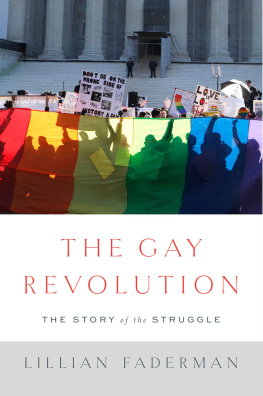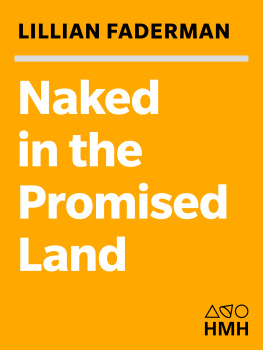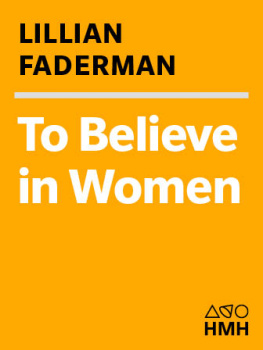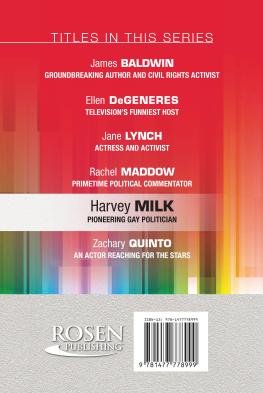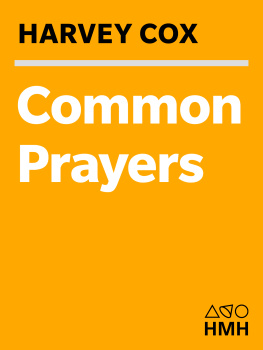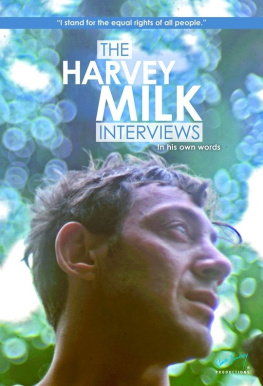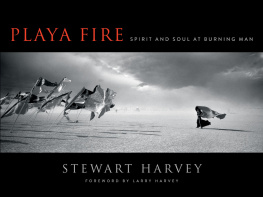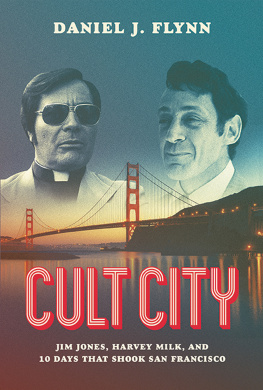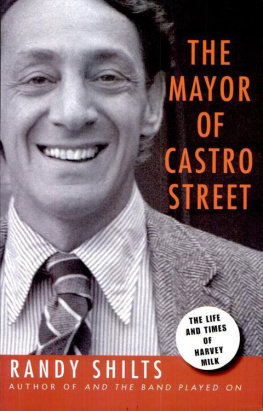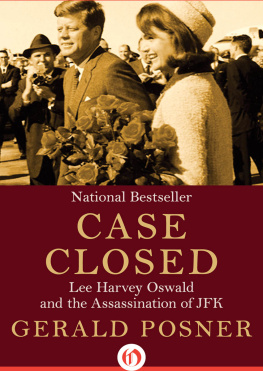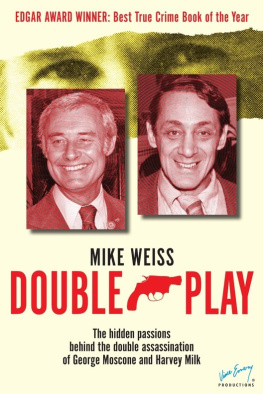HARVEY MILK

Harvey Milk
His Lives and Death

LILLIAN FADERMAN

Frontispiece: Harvey leading a protest against gay rights repeal, Orange Tuesday, 1977 (Jerome M. Pritikin)
Copyright 2018 by Lillian Faderman. All rights reserved. This book may not be reproduced, in whole or in part, including illustrations, in any form (beyond that copying permitted by Sections 107 and 108 of the U.S. Copyright Law and except by reviewers for the public press), without written permission from the publishers.
Yale University Press books may be purchased in quantity for educational, business, or promotional use. For information, please e-mail (U.K. office).
Set in Janson Oldstyle type by Integrated Publishing Solutions.
Printed in the United States of America.
ISBN 978-0-300-22261-6 (hardcover : alk. paper)
Library of Congress Control Number: 2017958760
A catalogue record for this book is available from the British Library.
This paper meets the requirements of ANSI/NISO Z39.48-1992
(Permanence of Paper).
10 9 8 7 6 5 4 3 2 1
To Phyllisagain and always
CONTENTS
HARVEY MILK

Introduction
H ARVEY M ILK charismatic, eloquent, a wit and a smart aleckwas one of the first openly gay men to be elected to any political office anywhere. On November 18, 1977, soon after he won a seat on the San Francisco Board of Supervisors, he made three tape recordings that he distributed to close friends. To be played only in the event of my death by assassination, he instructed at the beginning of each tape, though he did not keep it a secret from associates that he had made the tapes. When his irreverent young City Hall intern, Cleve Jones, learned of them, he teased Harvey: Hey, youre not Martin Luther King. Youre not important enough.
Harvey was shot to death one year and nine days later by Dan White, a fellow supervisor who had complained that San Francisco was being turned into Sodom by men who would not hide their homosexuality, and that Harvey Milk was in the forefront of the citys abhorrent transformation. The words Harvey dictated into his tape recorder in 1977 would have sounded foolishly melodramatic had he died a natural death; but with his murder they took on the weight of prophecy. If a bullet should enter my brain, he had said on the tape he made for his friend Frank Robinson, let that bullet destroy every closet door.
During Harveys lifetime (193078) most straight Americans could still entertain the fiction that they personally knew no one who was gay. He prodded his gay audiences to come outto parents, friends, neighbors, fellow workers, even to the people who work where you eat and shop. Coming out, he exhorted in his dynamic speeches, would be the most effective way to break down the toxic lies about homosexuals that characterized them as criminals, crazies, sinners, and subversives. As he understood, once gay people came out in great numbers they could no longer be seen as grotesque strangers skulking in the shadows and ready to pounce on innocent children; they would be sons, daughters, brothers, sisters, neighbors, and friends who, most Americans would have to agree, deserved first-class citizenship.
Harvey Milks martyrdom and the outpouring of gay anger and sorrow that followed helped trigger what has become a steady exodus from closets everywhere. These days a majority of Americans75 percentsay they have relatives or friends who are gay or lesbian. As Harvey prophesied, the demolition of closet doors has been the single most important factor in changing Americas hearts and minds and laws about gay people.
Harvey Milk has been dead for four decades; but his story continues to capture the popular imagination. He has been honored far beyond any other single gay figure. Tributes that would have been inconceivable during his lifetime, because they do not hide that he was a homosexual, have been heaped upon him. In 1999 Time magazine published a list of the 100 Most Influential Individuals of the 20th Century. Harvey Milk, the only openly gay person on the list, was included in a section People who know of no other gay historical figure know of Harvey Milk. He has gone from being a gay martyr to an American icon.
* * *
Harvey Milk was a complex man. There were seemingly many Harveys as he drifted for years through various stages, fumbling to find the niche from which he could fulfill the high, vague aspirations of his childhood. There was Harvey the supermacho college jock and navy deep-sea diver. Harvey the high school math teacher and earnest mentor to young people. Harvey the buttoned-down Wall Street securities research analyst and cheerleader for the protolibertarian presidential candidate and darling of the right wing Barry Goldwater. Harvey the long-haired, bead-wearing hippie. Harvey the actor, associate producer, and gofer to a Broadway celebrity. Harvey the businessman and leader of a business community. Harvey the progressive politician and gay icon. Each earlier life represented some genuine (if contradictory) aspect of Harvey Milkand in each transformation he thought for a while that he had found himself. But it was only in his final life, as an openly gay politician, that he discovered who he had wanted to be all along. In the five years he had left to live, as he grew into becoming that person, he made a coherent whole out of the many parts of himself.
Harvey is a study in opposites too. He was a cutup and a clown, but he was dead serious in battling the enemies of his causes. He was driven by genuine passion for justice but also by a lifelong love of the limelight. He fought fervently for the oppressed as a group, but he could be outrageously insensitive to individuals. He was a joyful participant in a wildly sexual gay culture, but he was capable of extraordinary emotional faithfulness, and he longed to make a permanent home with a partner. He was a chameleon who could change his style in an eye blink, but in his deepest principles he was steadfast.
* * *
In his Jewish identity also he was complex. He claimed he was not theologically oriented, but in one of his taped wills he clearly avowed his belief in God. But he never kept it a secret that Mausche Milch, his immigrant grandfather, had been a Yiddish-speaking peddler from Lithuania; or that Mausche had founded Sons of Israel, the first synagogue in Woodmere, Long Island, the town where Harvey was born.
Like many American Jews, Harvey did not see his strong Jewish identity as having anything to do with being religiously observant.
Yet his Jewish identification went much deeper than sentimentality. To exhort gays to be vigilant and battle-ready, he kept returning to cautionary stories of the Jews and the Nazis. The Holocaust became a major metaphor in the speeches he gave and the editorials he wrote. As a Jew and a homosexual, he felt himself to be doubly an outsider; and even when he was invited inside through his election to political office, he clung to his sympathies for the outsider, which he extended far beyond his own tribe. Jews know they cant allow other groups to suffer discrimination, he wryly observed, if for no other reason than we might be on that list someday.
He was very aware of himself as part of an ultraliberal Jewish tradition that fought for the oppressed of all stripes. His oratorical style, fiery and blunt in his demands for social justice, recalled the soapbox speakers of Delancey Street in the early decades of the twentieth century. He championed workers, women, racial minorities, the disabled, senior citizensall who suffered at the hands of the fat-cat insiders. He fought hard for San Franciscos strong gay rights ordinance; and he fought equally hard for rent control and the citys divestment from apartheid South Africa. Harvey Milks politics were strongly influenced by his gay identity. But just as deep an influence was his Jewish identity, and especially the values that liberal Judaism holds dear.
Next page

